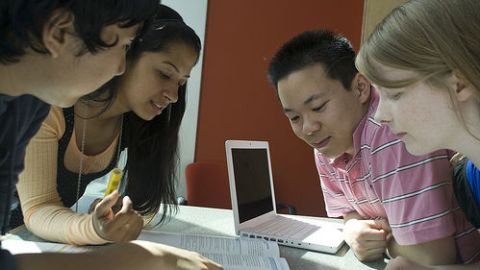A Post-Script on Teamwork: Can Groups Hurt Memory?

Today, I was planning to write about memory in decision making, but when I came across this new review in Current Directions in Psychological Science, I felt like I had to write a brief post-script to last week’s blog post on teamwork. A series of studies on the effects of group collaboration on memory: what better way to add another perspective to last week’s topic while introducing the next one?
How groups can hurt memory retrieval
Apparently, goal commitment and attainment is not the only place where a team approach can hurt. If we work together, chances are, we will recall things worse than if we were to work apart. Researchers at Stony Brook University showed that, when people learned a list of items, in a typical memory paradigm, those who then recalled the items individually were able to retrieve 68-70% of the items, while those who were asked to perform the recall in collaborative triads (groups of three people) remembered only 54-56%, a phenomenon known as collaborative inhibition.
Various factors contribute to collaborative inhibition. There are the social explanations, such as social loafing (we don’t try as hard because we don’t feel as personally responsible for or invested in the outcome) and social conformity (we do as the group does and try not to stand out too much), but there are also more fundamental factors at play. Namely, the individual retrieval process may actually be disrupted. In other words, when we recall information, we normally have our own way of doing so. We have strategies that work for us, mnemonics or memory devices and tricks, ties to personal information that makes the material somehow more relevant. But, when we are in a group, we have to listen to everyone else, too – and their way of retrieving information might be quite different from, or in the worst case, clash directly with, our own. And so, our own memory process becomes jumbled up and we can no longer remember what we knew just a moment earlier.
Lasting effects on remembering
Moreover, even after the fact, we might no longer have access to the stored information: once it has been disrupted, it might not go back inside its little memory drawer in the exact same way as before – or might have gotten lumped into a different drawer altogether. And so, the next time we go to look for it, we may not find it, and over time, we may even forget to look altogether. This phenomenon is called socially shared retrieval-induced forgetting, and can even occur with such charged memories as those surrounding September 11.
What’s more, the next time we look in that memory drawer, we might find that the memory has shifted, incorporating incorrect information that someone in our group had brought up when we first discussed it. In other words, our memories can become contaminated via the inputs of others with whom we discussed those memories. This is called social contagion.
Why study groups may hurt you more than they help you
Finally, memories that are created together to begin with (so, instead of learning that word list by yourself, you learn it together with someone else) seem to show even greater deficits, known as collaborative encoding deficits. When we create memory retrieval cues together, it seems, we are worse at it then when we do so alone. This makes sense if we consider the potential difference in encoding styles described above – and it should also make us more wary of group study sessions or other attempts at collaborative learning.
Is there a bright side?
But again, it’s not all bad. Groups can help us remember details we’ve forgotten and can weed out errors that we have inadvertently introduced into our own knowledge. Moreover, shared remembering may be useful in a therapeutic setting, helping individuals work through traumatic events and recover from Post-Traumatic Stress Disorder (PTSD).
Again, then, the point is not to say groups are bad for memory, or groups are good for memory, but to make ourselves aware of the possible influences that groups can exert on our memory processes and to be mindful of them as we make our decisions, be they decisions about how to learn information, or decisions on seemingly unrelated topics that may actually end up tying back to those initial memory processes. More on the last point, tomorrow.




